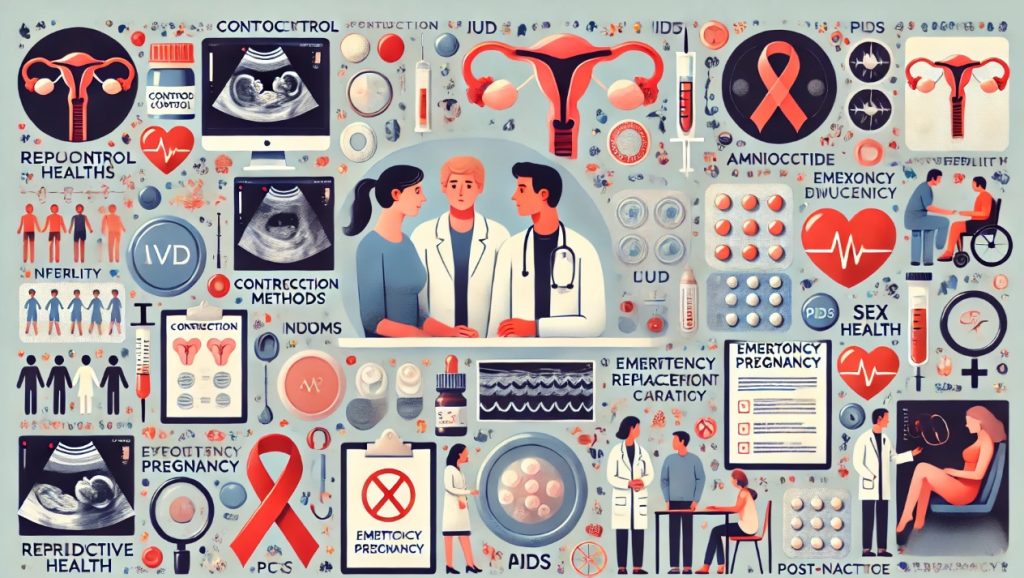
Reproductive Health – Problems and Strategies
Contraception
- Explanation: Methods used to prevent pregnancy.
- Example: Birth control pills, condoms, and intrauterine devices (IUDs).
- Image Prompt: Depict various contraception methods, including a pill pack, condom, and IUD.
Infertility
- Explanation: Inability to conceive after one year of regular unprotected sex.
- Example: Blocked fallopian tubes in women or low sperm count in men.
- Image Prompt: Show a couple in a doctor’s office discussing infertility.
Sexually Transmitted Infections (STIs)
- Explanation: Infections spread through sexual contact.
- Example: HIV, gonorrhea, chlamydia, and syphilis.
- Image Prompt: Illustrate awareness posters for STI prevention.
AIDS (Acquired Immunodeficiency Syndrome)
- Explanation: Caused by the HIV virus, leading to a weakened immune system.
- Example: Opportunistic infections like tuberculosis can occur due to weakened immunity.
- Image Prompt: Show a red ribbon symbolizing AIDS awareness.
Maternal Health
- Explanation: The health of women during pregnancy, childbirth, and postpartum.
- Example: Regular antenatal check-ups to monitor the health of mother and fetus.
- Image Prompt: Depict a pregnant woman undergoing a medical check-up.
Amniocentesis
- Explanation: A diagnostic procedure where amniotic fluid is sampled to detect genetic disorders.
- Example: Used to identify Down syndrome in a fetus.
- Image Prompt: Show a medical procedure where a doctor performs amniocentesis on a pregnant woman.
Menstrual Disorders
- Explanation: Conditions affecting the regularity or symptoms of menstruation.
- Example: Dysmenorrhea (painful periods) or amenorrhea (absence of menstruation).
- Image Prompt: Illustrate a woman experiencing cramps or using a hot water bottle.
Female Genital Mutilation (FGM)
- Explanation: Partial or total removal of the external female genitalia for non-medical reasons.
- Example: Practiced in some African, Middle Eastern, and Asian communities.
- Image Prompt: Depict a symbolic representation with a crossed-out symbol to indicate prohibition.
Polycystic Ovary Syndrome (PCOS)
- Explanation: A hormonal disorder causing enlarged ovaries with cysts.
- Example: Symptoms include irregular periods, weight gain, and acne.
- Image Prompt: Show an illustration of ovaries with multiple cysts.
Hormone Replacement Therapy (HRT)
- Explanation: Treatment used to relieve symptoms of menopause by replacing hormones.
- Example: Alleviates hot flashes and osteoporosis risk in menopausal women.
- Image Prompt: Depict a woman talking to a doctor about hormone therapy.
Prenatal Care
- Explanation: Healthcare provided to a pregnant woman to ensure a healthy pregnancy.
- Example: Regular monitoring of fetal growth and maternal health.
- Image Prompt: Show a healthcare worker performing an ultrasound on a pregnant woman.
Ectopic Pregnancy
- Explanation: A pregnancy in which the fertilized egg implants outside the uterus.
- Example: Commonly occurs in the fallopian tube, requiring medical intervention.
- Image Prompt: Illustrate a diagram of an ectopic pregnancy in the fallopian tube.
Emergency Contraception
- Explanation: Methods used to prevent pregnancy after unprotected sex.
- Example: “Morning-after” pills or copper IUD insertion.
- Image Prompt: Show an emergency contraceptive pill package.
Sex Education
- Explanation: Teaching about human sexuality, reproductive health, and safe sexual practices.
- Example: School programs that provide information on contraception and STIs.
- Image Prompt: Illustrate a classroom setting with a teacher explaining reproductive health.
Postnatal Care
- Explanation: Care provided to the mother and newborn after birth.
- Example: Monitoring the baby’s health and ensuring the mother’s recovery.
- Image Prompt: Depict a nurse checking on a newborn and mother in a hospital room.
See in Fig:

Here’s an image illustrating various concepts related to reproductive health, such as contraception, maternal health, and postnatal care.
10 Questions and Answers about Reproductive Health Problems and Strategies
1. Question: What is reproductive health?
- Answer: Reproductive health refers to the well-being of individuals in all matters related to the reproductive system, including physical, emotional, social, and mental health aspects.
- Explanation: It involves proper functioning of the reproductive system at all stages of life, encompassing safe sexual practices, the ability to have children, and access to health services for issues like fertility, contraception, and sexually transmitted infections (STIs).
2. Question: What are common reproductive health problems?
- Answer: Common reproductive health problems include sexually transmitted infections (STIs), infertility, menstrual disorders, and reproductive cancers.
- Explanation: These issues can affect both men and women, impacting the reproductive system’s ability to function normally and sometimes leading to long-term health complications if not treated.
3. Question: What is the role of contraception in reproductive health?
- Answer: Contraception helps prevent unwanted pregnancies and reduces the risk of STIs by enabling individuals to manage their reproductive choices.
- Explanation: Methods like birth control pills, condoms, and intrauterine devices (IUDs) allow individuals to avoid unintended pregnancies and plan their families, while also reducing the spread of STIs.
4. Question: How can infertility affect reproductive health, and what are some causes?
- Answer: Infertility can cause emotional and psychological stress and may be due to factors like hormonal imbalances, blocked fallopian tubes, or low sperm count.
- Explanation: Infertility affects a person’s ability to conceive naturally, and treatments may involve medication, surgery, or assisted reproductive technologies like in-vitro fertilization (IVF).
5. Question: What are some strategies to prevent sexually transmitted infections (STIs)?
- Answer: Strategies include using condoms during sexual intercourse, getting regular health check-ups, and vaccination for preventable STIs like HPV.
- Explanation: STIs can lead to serious health issues if untreated, such as infertility and cancer. Prevention strategies focus on safe sexual practices and timely medical intervention.
6. Question: What is the significance of maternal health in reproductive health?
- Answer: Maternal health ensures the safety and well-being of both the mother and the child during pregnancy, childbirth, and the postnatal period.
- Explanation: Good maternal health includes regular antenatal check-ups, proper nutrition, and access to healthcare, which help reduce risks like maternal mortality and birth defects.
7. Question: How does sex education contribute to better reproductive health?
- Answer: Sex education provides individuals with knowledge about their bodies, safe sexual practices, and reproductive health rights.
- Explanation: It helps prevent teenage pregnancies, reduces the spread of STIs, and encourages responsible behavior. Comprehensive sex education covers topics like contraception, anatomy, and sexual consent.
8. Question: What is the impact of female genital mutilation (FGM) on reproductive health?
- Answer: FGM can cause severe pain, infections, childbirth complications, and long-term psychological issues.
- Explanation: It is a harmful practice involving the partial or total removal of the external female genitalia for non-medical reasons. Efforts to eliminate FGM focus on education, legal measures, and cultural change.
9. Question: Why is prenatal care important for reproductive health?
- Answer: Prenatal care ensures the health of the mother and developing fetus through regular monitoring and early detection of any complications.
- Explanation: It involves medical check-ups, nutritional advice, and screening for potential health problems, reducing risks like preterm birth and low birth weight.
10. Question: What are emergency contraception methods, and when should they be used?
- Answer: Emergency contraception methods are used to prevent pregnancy after unprotected sex or contraceptive failure.
- Explanation: They include “morning-after” pills and copper IUD insertion. They are effective within a specific time frame (usually 72 hours for pills) and are not intended for regular contraceptive use.






